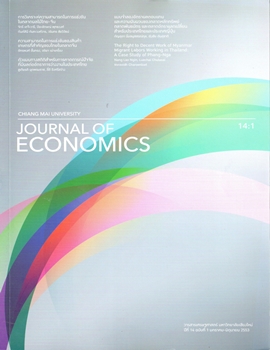ตัวแบบทางสถิติ สำหรับการคาดการณ์ปัจจัยที่มีผลต่ออัตราการว่างงานในประเทศไทย
คำสำคัญ:
Unemployment rate, Longitudinal data, Generalized estimating equations, Generalized linear mixed models, Negative binomial, อัตราการว่างาน, ข้อมูลระยะยาว, สมการของการประมาณค่าวานัยทั่วไป, ตัวแบบผสมเชิงเส้นวางนัยทั่วไป, ทวินามนิเสธบทคัดย่อ
The purpose of this study was to determine the potential factors affecting unemployment rates in Thailand during the period of 2005 to 2007. The dataset were used in this study was collected from the National Statistical Office (NSO ) and the department of employment as a longitudinal data for 76 provinces in Thailand. Two statistical approaches of generalized estimating equations (GEE) and generalized linear mixed model (GLMM) were employed to develop the prediction models of unemployed rates, using these variables: population density, number of deaths, number of entrepreneurs, number of factories, finance and minimum wage rate as predictors in the process of modeling.
Our findings indicate that the appropriate models for prediction of unemployment rates were the followings: 1) the GEE model that treated the dependence variable, number of unemployed persons, as a negative binomial distribution, and 2) the GLMM model with random intercept that also treated the dependence variable, number of unemployed persons, as a negative binomial distribution. The statistical significant factors at a 0.05 level consisted of number of deaths, finance, and minimum wage rates.
ดาวน์โหลด
ฉบับ
ประเภทบทความ
สัญญาอนุญาต
ข้อคิดเห็นที่ปรากฏและแสดงในเนื้อหาบทความต่างๆในวารสารเศรษฐศาสตร์มหาวิทยาลัยเชียงใหม่ ถือเป็นความเห็นและความรับผิดชอบโดยตรงของผู้เขียนบทความนั้นๆ มิใช่เป็นความเห็นและความรับผิดชอบใดๆของวารสารเศรษฐศาสตร์ มหาวิทยาลัยเชียงใหม่
บทความ เนื้อหา และข้อมูล ฯลฯ ในวารสารเศรษฐศาสตร์มหาวิทยาลัยเชียงใหม่ ถือเป็นลิขสิทธิ์เฉพาะของคณะเศรษฐศาสตร์มหาวิทยาลัยเชียงใหม่ หากบุคคลหรือหน่วยงานใดต้องการนำทั้งหมดหรือส่วนหนึ่งส่วนใดไปเผยแพร่ต่อหรือเพื่อกระทำการใดๆ จะต้องได้รับอนุญาตเป็นลายลักษณ์อักษร จากวารสารเศรษฐศาสตร์ มหาวิทยาลัยเชียงใหม่






